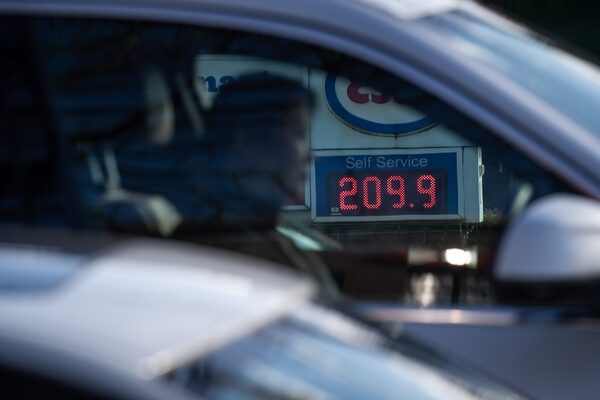
A sign displays the price of a litre of regular grade gasoline at an Esso gas station as a motorist waits at a red light, in Vancouver, on March 8.DARRYL DYCK/The Canadian Press
Canada’s political leaders must know that they can’t solve our inflation problem simply by throwing money at it. But that’s not going to stop some from trying.
In what stands as the most unsubtle government counterinflation gesture to date, Quebec’s new budget includes a $500 payment to each and every adult with an income below $100,000, “to help Quebeckers cope with the rising cost of living.”
“The increase in prices has an impact on households, particularly those with lower incomes,” Finance Minister Eric Girard said in his budget speech – before pointing out that the payments cover 6.4 million Quebeckers, or about 90 per cent of the adult population.
So, not exactly a policy support aimed at aiding low-income people. More a helicopter drop of $3.2-billion to almost every voter who has noticed that things are more expensive this year.
Why rising inflation in Canada could lead to a wave of strikes and lockouts
Quebec is not alone in looking for ways to lean the government coffers against inflation. Earlier this month, for example, Alberta announced it would temporarily remove its 13-cents-a-litre tax on gasoline and diesel. The federal Conservatives are calling for a “holiday” on the goods and services tax (GST) on the same fuels.
Those approaches don’t match the simple appeal of Quebec’s direct cash handouts, but they nevertheless amount to turning tax money over to voters to compensate them for their inflation troubles.
Good politics? Probably. Sound economic policy? Not so much.
Handing money to consumers does not fight inflation, it merely helps defray inflation. It treats the symptom, overlooks the disease. It does nothing to expand supply or remove barriers slowing it, which is at the root of our current problem.
Worse, such consumer supports act as a de-facto stimulus for demand at a time when demand is already strong, the Canadian economy is already running at near full speed and supplies already can’t keep up.
“While we understand that it is difficult for governments to resist the temptation to act in this way, there is reason to wonder whether running deficits for this purpose in a context of full employment might not put additional pressure on prices, especially since other levels of government might follow suit,” National Bank of Canada economists Darren King and Matthieu Arseneau said in a research note.
To be fair, these leaders are merely responding to the demands from constituents that governments do something – anything – to address the situation, cries that have grown louder and broader as inflation has accelerated.
It’s odd that some of the political leaders most receptive to those cries are of a conservative bent. Traditionally, conservatives aren’t fans of interfering with market forces. They aren’t strong advocates of government stepping in to shield us from all bad economic outcomes.
Frankly, the current inflation is, in no small part, the price we are now paying for governments shielding us from very, very bad outcomes over the past two years. We ran up public debts, propped up household incomes and sustained consumer demand to avert an economic depression and set the stage for a strong recovery. Few would dispute that this was necessary. But a consequence has turned out to be higher inflation.
Earlier in the pandemic, many policy commentators had advocated for governments to raise taxes, at least temporarily, as a specific means to start paying down the bills incurred in protecting Canadians from economic disaster. That’s pretty much where we expected governments to be by now: looking at ways to reverse those big spends and clean up the mess, knowing Canadians are employed and growth is on solid footing.
Perhaps inflation is, effectively, serving as that “tax.” (Yes, I know that inflation is not actually a tax, but hear me out.) A consequence of higher inflation has been higher-than-expected nominal gross domestic product (i.e. GDP including the effects of price increases) – and by extension, higher government revenues. This is even more the case for governments in Canada, which benefit from taxation of income generated by surging prices for energy and other commodities. So, in effect, governments are now seeing the boost in revenues that will help pay the pandemic bills while voters pay the price, in the form of inflation. It’s not a tax increase, but it has a similar effect, on both sides of the ledger.
And it has come at a time when, let’s be honest, the economy can best bear it. We no longer need governments to be bailing us out en masse (as much as we might like it).
We need them to bring their fiscal footprint back down to size, withdraw stimulus and focus spending on investments that will expand supply capacity and create an environment for noninflationary growth. Any short-term supports to ease the impact of inflation should focus on low-income households most vulnerable to high inflation. (Consider that Quebec’s $3.2-billion handout is five times as much as it budgeted to improve supply of, and access to, low-income housing.)
It wasn’t easy getting to where we are today with inflation, and it won’t be easy getting out. Let’s stop looking for quick fixes.
Your time is valuable. Have the Top Business Headlines newsletter conveniently delivered to your inbox in the morning or evening. Sign up today.
 David Parkinson
David Parkinson